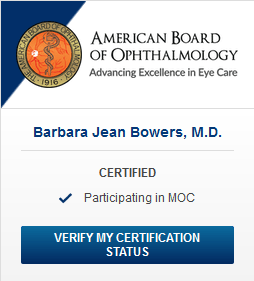(270) 415-0245
Mon – Thurs: 7:30AM – 5:00PM
Fri: 8:00AM - 12:00PM
Sat - Sun: Closed
FAQS
Got a question? We’re here to help.
-
WHAT CAN I EXPECT DURING AN EYE EXAMINATION?
A comprehensive eye exam will evaluate not only how well you see, but also identify potential eye diseases. You can expect to be in our office for about an hour and a half. A medical history will be taken, followed by a measurement of your vision. Then, a sequence of tests will be performed to determine the health of your eyes. Your eyes will be dilated, so expect increased light sensitivity and blurred vision for a few hours following the exam. If you are being seen for a surgical consultation, you can expect to be in our office about 2 hours to complete additional testing.
-
WILL IT BE OKAY FOR ME TO DRIVE MYSELF HOME FROM MY EYE EXAM?
Dilation does not usually effect the patients ability to drive. If you are concerned, then we suggest you bring a driver with you to your appointment. We recommend you bring sunglasses with you to wear after your exam. We do have disposable sunglasses for your convenience.
-
HOW LONG DOES AN EYE DILATION LAST?
4 hours minimum. Some eyes stay dilated longer. Some as long as 2 days in rare instances.
-
IS IT OKAY IF I ASK A LOT OF QUESTIONS?
We take your eye health very seriously and encourage questions. We will take the time to answer all of your questions. We encourage our patients to write down questions that they want to ask before their visit. It’s important to us that you understand your condition and how your therapy is designed specifically for you.
-
DOES THE KIND OF LASER A SURGEON USES FOR LASIK REALLY MATTER?
Absolutely! The older generations of technology are still FDA approved and in use across the U.S. This technology is still capable of freeing you from glasses and contacts, but your safety, quality of vision and chances of 20/20 or better can be compromised. That is why it is important to do your research and select a center that invests in the most advanced technology, to ensure yourself the best possible outcome
-
IS BLADELESS LASIK REALLY BETTER THAN REGULAR LASIK WITH A BLADE?
Definitely! The newest laser flaps are even customized to each cornea. The corneal flaps created with femtosecond laser technology are thinner, more precise, smoother, more comfortable and safer than those created with a blade. This allows for better post operative vision. We offer ONLY bladeless lasik. We don’t even have a blade in our center! We offer ONLY the BEST!
-
HOW DO I KNOW WHICH PROCEDURE IS RIGHT FOR ME?
Come in for a thorough evaluation and testing and Dr. Bowers and her staff will discuss with you all of your options as well as the pros of cons of each. This will allow you to make the most informed decision about your vision correction.
-
WHAT IS A CATARACT?
Almost everyone will develop cataracts as they grow older. A cataract is a clouding of the lens inside your eye. The images below show a normal eye and an eye that has developed cataracts.
Cataract surgery is one of the safest and most successful procedures done today. It has been performed successfully tens of millions of times. The procedure is an outpatient surgery, requiring only a few hours of your time. Most patients return to their daily activities the next day. The doctors’ cataract procedures average about eight minutes. The doctors of Innovative Ophthalmology use the most advanced FDA approved phacoemulsification ultrasound and laser technology to remove the cataract. This means no needle, no stitch, and no patch and in some instances, no blades
-
HOW DO I KNOW IF I AM GETTING CATARACTS?
Cataract symptoms usually begin with glare, starbursts, and halos around lights at night. This can make driving at night uncomfortable or difficult. Early cataracts also cause blurring or dimming of vision. You may struggle more with reading books or road signs that used to appear clear. Cataracts also filter out light entering the eye, so you may find yourself looking for more light or brighter light to see things.
-
WHAT DO I NEED TO BRING WITH ME TO MY FIRST APPOINTMENT?
For your first visit to Innovative Ophthalmology, we would like you to bring the following:
A list of all medications you currently take
A list of any allergies you may have to any medications
All of your current prescription eyewear
Your insurance card(s)
A photo ID
Referral from your Primary Care Physician (if required by your insurance company)
To make your first visit easier, we encourage you to download our Patient Information sheet to fill out in advance. You will find it under the Patient Forms tab above.
-
MY REGULAR DOCTOR IS SENDING ME TO INNOVATIVE OPHTHALMOLOGY TO TREAT A SPECIFIC MEDICAL PROBLEM WITH MY EYES. WILL MY HEALTH INSURANCE COVER SOMETHING LIKE THIS?
Generally speaking, if your primary care physician refers you for a medical reason, most health insurance policies will cover the visit. It is always a good idea for you to check with your insurance company first if you have questions about your coverage.
-
WHAT ARE MY PAYMENT OPTIONS?
Co-payments, co-insurance, and payment for services that are not covered by insurance must be paid at the time of your visit. We accept personal checks, Visa, Master Card, American Express and debit cards. For surgical procedures, financing is available. Please click on the Financing tab above to see what is available.
-
DO YOU DO ROUTINE EYE EXAMS AND SCREENINGS?
Yes, these services are provided every day at Innovative Ophthalmology. We use state-of-the-art equipment to perform these services on patients of all ages.
-
HOW OFTEN SHOULD I HAVE MY EYES EXAMINED?
We recommend adult examinations of the eyes be performed on a regular basis. Below is a recommended time line of how often an adult with no ocular pathology should receive an eye examination:
Ages 20-39, every two to four years
Ages 40-65, every one to two years
Ages 65 and older, once a year
Do you see children and adults? Yes, we welcomes patients of all ages.
-
MY REGULAR EYE DOCTOR IS RECOMMENDING SURGERY BUT DOESN'T PERFORM IT HIMSELF. IF I GO TO YOU FOR MY SURGERY, DOES THAT MEAN I'LL HAVE TO SWITCH EYE DOCTORS?
No, you do not need to switch doctors if you don’t want to. We often perform surgery on patients referred from other doctors. After surgery you may choose to go back to your referring doctor for your post-op care and future eye care needs.
-
DO YOU ACCEPT MY INSURANCE?
Please call our office to inquire. We will work with you if you do not have insurance or have an insurance plan in which we do not participate.
-
I THINK I HAVE SOMETHING WRONG WITH MY EYES, BUT I'M NOT SURE. WILL MY MEDICAL INSURANCE COVER THE VISIT?
Many patients put off seeing their eye doctor thinking Medicare or their insurance company will not cover their eye care. Medicare and most insurance plans do cover office visits especially for glaucoma, diabetes, cataracts and other medical conditions that can affect your eyesight. Please feel free to call our office if you have specific questions regarding insurance coverage.
-
WHY DO I NEED TO PAY AN ADDITIONAL FEE FOR CHECKING MY EYEGLASS PRESCRIPTION?
Determining your refractive error and best corrected visual acuity is an essential part of a complete eye exam. Unfortunately, Medicare and most other Insurers have elected not to cover this procedure. This fee is universal to all eye care practices.
-
WHAT DOES DR. HOBBS SPECIALIZE IN?
Dr. Hobbs specializes in diagnosis and medical and laser treatment of numerous ocular diseases and conditions. His area of special interest is the medical and laser treatment of glaucoma.





